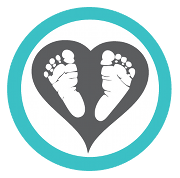 There is a very good chance that your newborn will have some degree of physiological jaundice (about 60%) and this is usually considered a normal condition in the early days following birth. Most cases do not require treatment; just monitoring to be sure the level doesn't go too high which can have serious consequences for the baby's development. The jaundice usually peaks around the third or fourth day of life, then it starts to descend to normal levels. Since many babies are discharged prior to this time, the mother might be asked to make an early pediatrician appointment to have this checked. High levels require treatment to prevent brain damage.
There is a very good chance that your newborn will have some degree of physiological jaundice (about 60%) and this is usually considered a normal condition in the early days following birth. Most cases do not require treatment; just monitoring to be sure the level doesn't go too high which can have serious consequences for the baby's development. The jaundice usually peaks around the third or fourth day of life, then it starts to descend to normal levels. Since many babies are discharged prior to this time, the mother might be asked to make an early pediatrician appointment to have this checked. High levels require treatment to prevent brain damage.The reason for this common condition is that the baby is born with extra red blood cells which are then broken down (think replacement and recycling here). This means extra work for an already somewhat immature liver (especially in a preterm baby or one who was stressed at birth). The enzymes it produces to break down the bilirubin may not be adequate. If bili levels in the blood are higher than usual, the condition of jaundice occurs and the baby may even look a little bit yellow, especially in the whites of the eyes. What is significant is the age of the baby (measured in hours after birth) and the bilirubin levels detected in the blood. These factors determine if any treatment is necessary.
The baby eliminates excess bilirubin through the normal process of urination and passing stool. Taking in nourishment leads to natural excretion so it is important for your baby to be eating by that time. The first few days are when the baby does not take in a large volume but the early breastmilk is very rich in nutrients and antibodies. When the mature milk comes in, the baby will get all he or she needs through the breast. In most cases supplementation is NOT necessary and can reduce your milk supply, subject your baby to other digestive problems and even lead to nipple confusion so this should only be done very cautiously after trying other methods to be sure he or she gets enough to eat. Note: many people mistakenly think the baby should be getting 2-4 ounces at birth but their tiny tummies aren't yet ready for this and nature knows what it is doing when the mom makes colostrum and later mature milk.
The determination of whether or not to treat the jaundice depends on the level of bilirubin in the blood and the age (in hours) of the baby. This way the doctor can determine whether or not it is in the normal range. High levels of bilirubin (>30) can be a sign of kernicterus - a rare, but serious form of jaundice.
In addition to nourishment, the usual treatment for infants with elevated bilirubin levels is phototherapy. The baby is exposed to bright light that is absorbed through the skin, altering the bilirubin and making it easier for the baby's liver to get rid of it. Sometimes this is done in the hospital and sometimes it is done in the home with portable bili-lights.
Confusion sometimes comes when people are told to give the baby formula instead of breastmilk "because of the jaundice" - a common misconception. Breastmilk not only works and is the best nutrition for the baby; it comes without the potential side effects of allergy or intolerance to the cow's milk protein, soy or other ingredients.
There is a less common form of jaundice (so called "breast milk jaundice") whose actual cause is unclear but is aggravated by breast milk. This type of jaundice peaks at 10-21 days (as opposed to the 3-4 days peak in physiological jaundice) and may last for months. Breastfeeding expert and author, Dr. Jack Newman says, " Breastmilk jaundice is normal. Rarely, if ever, does breastfeeding need to be discontinued even for a short time." It is important to know the difference so you aren't misled and encouraged to stop breastfeeding or to give bottle supplements by well-meaning, but misguided advisors.
Read more about this unusual type of jaundice and how breastfeeding is affected here.
























This is a very common phenomenon which sure scares the new mother.But the condition subsides in a week and the baby is just fine and healthy again.
ReplyDeleteYes it is quite hard on the system when the child is diagnosed jaundice at the first infant stage,the liver is affected as it has to recover from the disease.Hearing first time about the breast milk jaundice though.
ReplyDeleteThanks for the discussion of all the types of jaundice...yes many babies go through the problem of jaundice as they are born.And it is very painful for the mother to see the new born suffer so.
ReplyDeleteWhat's up, I desire to subscribe for this webpage to obtain most recent updates, therefore where can i do it please help out.
ReplyDeleteMy website > best heart rate monitor
There is s subscribe box in the upper right hand column. If that doesn't work, let me know via another comment.
Delete